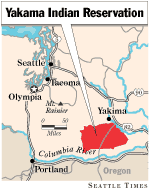 |
 |
 |
| Your account | Today's news index | Weather | Traffic | Movies | Restaurants | Today's events | ||||||||
|
December 2, 1996
Hired 'rescuer' ends up in prison
John Sawicki was bankrupt. What happened when they found each other is another demonstration of what the federal government's policy of deregulation has done to its Indian-housing program. In 1993, the Yakama tribal-housing authority, which manages housing subsidized by the Department of Housing and Urban Development, was in trouble. Seventy percent of the residents of HUD housing on the Central Washington reservation were not making their house payments, and the department was threatening to give the housing authority high-risk status, which would make it tough to get future funding. Tribal leaders went looking for an entrepreneur to rescue the program. They found Sawicki, an unemployed businessman who had been mailing out job applications from his home near San Diego for nearly a year. The Yakamas were taken with Sawicki's resume. He hadn't mentioned his failed water-taxi, boat-yard and tourism businesses. He emphasized his "successes" and his membership on a citizen advisory board of Jack Murphy Stadium in San Diego. He was charismatic, assertive and "seemed to understand HUD," said Clifford Moses, a member of the tribe's housing committee. Sawicki was hired in September 1993 as a troubleshooter. A month later, the tribe fired the executive director of the housing authority and put Sawicki in charge, paying him an annual salary of $82,500. Additionally, he collected $2,500 a month more for travel expenses and lodging, even after he moved to the Yakima Valley. In the year that followed, HUD investigators say, Sawicki stole $92,000 in cash and goods from the housing authority. He overcharged for moving expenses and billed the authority for repairs to his wife's car. He dipped into housing money to buy himself luxury home appliances, a horse trailer, an irrigation system and a chicken coop. He took three housing-authority tractors worth about $15,000 and told an agency maintenance official they had been sold. Then he billed the housing authority more than $6,000 to repair them. He kept powerful tribal members at bay by doing them favors. He ordered his employees to pay for $16,000 worth of remodeling at the HUD-subsidized home of housing-authority Chairman Gordon Queahpama, though the expenditure violated federal regulations. He moved the relative of another tribal leader ahead of others on the waiting list for a HUD-financed house and gave other tribal leaders appliances. Sawicki wrote a note in his computer, found later by investigators, in which he said tribal leaders hit him with "daily requests for special considerations, for themselves and their relatives and friends." All of this went on without HUD's knowledge, although it was the department's — and the taxpayers' — money. Under deregulation that began in 1992, HUD had drastically reduced scrutiny and oversight of tribal-housing authorities. About the time Sawicki arrived, the Yakama housing program was declared a high risk by HUD, and federal officials began looking at the housing authority more closely. Department employees on higher alert didn't have to look too long before they caught on to Sawicki. By fall 1994, both HUD and the Bureau of Indian Affairs were investigating. Sawicki was suspended that October. A federal grand jury indicted him in January 1995; three months later, he pleaded guilty in U.S. District Court to theft of government funds. He was sentenced to 15 months in prison and ordered to pay a $15,000 fine and make $9,000 restitution. The authority remains plagued by unpaid rents. Sawicki, now on probation, worked briefly at a Spokane restaurant and is back in the Yakima area. He declined to be interviewed.
Jerry Leslie, Northwest regional administrator for HUD's
Indian-housing program, said tribes are plagued by "slick
characters" like Sawicki. Yet the loose regulation policy that
allows them to continue is just getting looser, he said.
|
|
|||||||||||||||||||||||||||||||||||||||
seattletimes.com home
Home delivery
| Contact us
| Search archive
| Site map
| Low-graphic
NWclassifieds
| NWsource
| Advertising info
| The Seattle Times Company
